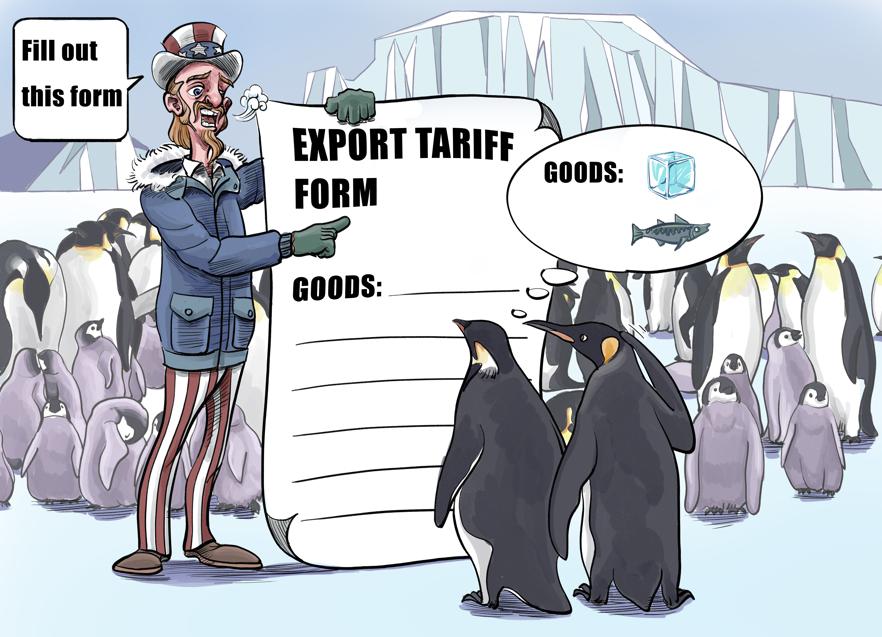Editor's note: The US tariff escalation threat against China and other countries compounds its mistake and further exposes its nature of blackmail. China will resolutely take countermeasures to safeguard its rights and interests and maintain a normal international trade order. Three experts share their views on the issue with China Daily.

US President Donald Trump's tariff policy is a tragic mistake for the United States as well as the rest of the world. It will undermine stabilizing international policies, raise the cost of goods for US consumers and businesses, and diminish US influence in economic globalization.
By aggressively pushing forward the "America First" strategy and slapping additional tariffs on imports from almost all countries, thus causing damage to the US and other economies, the US administration is turning the US into an unattractive trade and investment partner, and isolating the country from the global economy.
As other countries adapt to the US' tariffs by forging new trade networks, the US could become an isolated "trade island" adrift in a rapidly changing global economy.
READ MORE: China, EU vow to jointly uphold multilateral trading system
The US' role in the global economic order is at an inflection point. The US administration's policies are replacing the US-led 20th century international economic order with a new Europe-and Asia-led economic and geopolitical order. The tariff policy is a catastrophic move for the US, as it is breaking global supply chains, destroying the US' economic leadership, and weakening US-led alliances.
Domestically, the US' tariffs will have destructive effects on US consumers and businesses, by raising inflation, and worsening the condition of the poor living paycheck to paycheck and the middle class.
The US administration's belligerent move will increase the production costs of American businesses that rely on imported materials — who will pass down the increasing costs to consumers — and cause job losses and unemployment rather than, as the administration claims, create jobs in the manufacturing and agriculture sectors. Some rich US investors and US companies may benefit from reduced foreign competition in the short term, but the overall impact of the tariffs on the US businesses and consumers will be devastating and long-lasting.
The US administration's aggressive tariff policies will have an impact far beyond immediate economic disruptions. By undermining the viability of economic globalization, which has helped lift hundreds of millions of people out of poverty, fostered worldwide interconnected supply chains, and benefited many countries, the US administration is eliminating decades of progress in human development and international trade.
The US administration says the aggressive tariff policies will protect US industries and reduce what it claims to be unfair trade practices. But, in effect, it is invalidating the US' leadership in global trade.
The US leader says tariffs are necessary to protect US industries and reduce trade deficits, but, in reality, the tariffs will increase the country's trade deficits and destabilize the US economy.
The US has shaped global economic policies, which in turn fostered cooperation. The US administration's tariff policy and "America First" strategy will cripple America's role in the global trade system and alienate its allies.
European Union leaders have described the tariffs as a blow to transatlantic cooperation and betrayal of US allies. By imposing tariffs on allies such as the EU and Canada while exempting Russia in specific cases, the US administration has widened the rift with the US' key partners.
As trust between the US and its allies diminishes, divisions within Western economic and national security coalitions are inevitable. French President Emmanuel Macron has already proposed that the EU halt investments in the US, reflecting the EU's growing frustration with the US' hostile policies.
ALSO READ: Washington trade war necessitates revival of WTO Appellate Body
Strained relations have long-term implications. With country-country trust collapsing, the US' allies have to strengthen their trade ties independent of the US, which in turn will pave the way for China to provide innovative and reliable leadership in international trade.
Many countries have announced retaliatory tariffs on US goods, with EU leaders being particularly critical of the US' approach because it undermines decades of cooperation. At a time when global markets are still grappling with post-pandemic challenges, inflation and supply chain disruptions, the US' tariffs have exacerbated their problems and complicated supply chain issues, which could trigger a global recession. Economists have been issuing warnings that such instability will deal a severe blow to both developing and developed economies.
Amid the global mayhem caused by the US' trade war, the China-proposed Belt and Road Initiative provides a constructive 21st century framework for international economic cooperation. Countries across the world should seize the opportunities offered by the initiative and build new, constructive and mutually beneficial trade relations.
The author is chairman of the America-China Partnership Foundation.
The views don't necessarily reflect those of China Daily.


